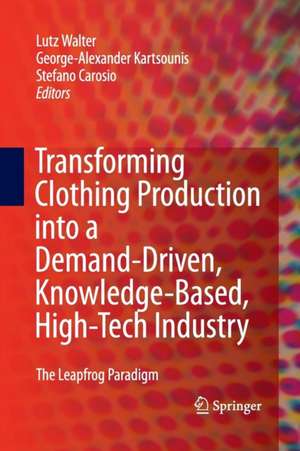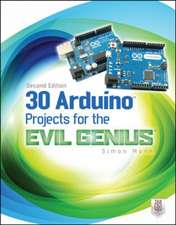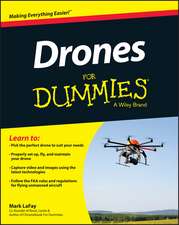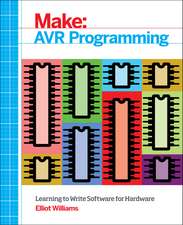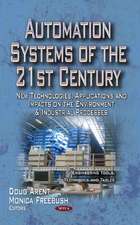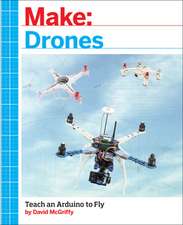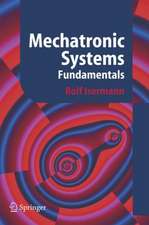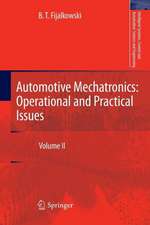Transforming Clothing Production into a Demand-driven, Knowledge-based, High-tech Industry: The Leapfrog Paradigm
Editat de Lutz Walter, George-Alexander Kartsounis, Stefano Carosioen Limba Engleză Paperback – 14 noi 2014
"Transforming Clothing Production into a Demand-Driven, Knowledge-Based, High-Tech Industry" is a collection of short papers from prominent researchers involved with the LEAPFROG (Leadership for European Apparel Production From Research along Original Guidelines) initiative. LEAPFROG proposes a revolutionary industrial paradigm based on research results in scientific-technological fields.
| Toate formatele și edițiile | Preț | Express |
|---|---|---|
| Paperback (1) | 637.28 lei 43-57 zile | |
| SPRINGER LONDON – 14 noi 2014 | 637.28 lei 43-57 zile | |
| Hardback (1) | 643.48 lei 43-57 zile | |
| SPRINGER LONDON – 28 sep 2009 | 643.48 lei 43-57 zile |
Preț: 637.28 lei
Preț vechi: 749.73 lei
-15% Nou
Puncte Express: 956
Preț estimativ în valută:
121.94€ • 127.66$ • 100.90£
121.94€ • 127.66$ • 100.90£
Carte tipărită la comandă
Livrare economică 07-21 aprilie
Preluare comenzi: 021 569.72.76
Specificații
ISBN-13: 9781447157670
ISBN-10: 1447157672
Pagini: 232
Ilustrații: XIX, 212 p.
Dimensiuni: 155 x 235 x 12 mm
Greutate: 0.33 kg
Ediția:2009
Editura: SPRINGER LONDON
Colecția Springer
Locul publicării:London, United Kingdom
ISBN-10: 1447157672
Pagini: 232
Ilustrații: XIX, 212 p.
Dimensiuni: 155 x 235 x 12 mm
Greutate: 0.33 kg
Ediția:2009
Editura: SPRINGER LONDON
Colecția Springer
Locul publicării:London, United Kingdom
Public țintă
Professional/practitionerCuprins
Automated Garment Assembly and Manufacturing Simulation.- Innovative Textile Materials, Stiffening Procedures and Fabric-Joining Methods.- Virtual Prototyping: From Concept to 3D Design and Prototyping in Hours.- New Quality of Partnership in the Textile World – Concepts and Technologies.- Conclusions: Results Achieved, Lessons Learned, Follow-Up Research Work and the Industry’s View on the Way Ahead.
Notă biografică
Lutz Walter is head of the R&D, innovation and projects department of Euratex, a European apparel and textile organisation based in Brussels. He has a degree in business management and political science, and has been working in European affairs since 1998. Since joining Euratex in 1999, he has coordinated various European research projects and networks, such as the E-Tailor project (2000-2002), or the LEAPFROG initiative (from 2004). He is secretary of the governing council of the European Technology Platform for the Future of Textiles and Clothing since its establishment in late 2004.
George-Alexander Kartsounis is a lecturer at the University of Athens. Since 1992 he has been scientific coordinator of a number of key R&D projects for the textile/clothing industry, such as ITEX (Information Technologies for the Textile Industry), E-Tailor, and Fashion On-Line. He has a multidisciplinary background in industrial automation (MSc), robotic vision (PhD), physics (BSc) and IT (technology and R&D advisor in IT applications). Apart from his technical management experience, obtained through the coordination of large multidisciplinary projects, his research interests are currently focused on applications related to the modeling of the human body, as well as the application of image analysis and AI techniques in material parameters prediction and testing.
Stefano Carosio is responsible for the innovation and technology transfer area of D’Appolonia, a 200-strong Italian engineering company actively involved in contract research in areas including materials, modeling, and machine vision. He is also responsible for the European Space Agency's technology transfer programme. In the last five years he has been actively involved in 30 successful adaptations of advanced technologies in industrial applications, including the use of smart cameras and space spectrographs for fabric inspection, shapememory alloys in technical fabrics, as well as integration of thermal regulating functions in protective clothes.
George-Alexander Kartsounis is a lecturer at the University of Athens. Since 1992 he has been scientific coordinator of a number of key R&D projects for the textile/clothing industry, such as ITEX (Information Technologies for the Textile Industry), E-Tailor, and Fashion On-Line. He has a multidisciplinary background in industrial automation (MSc), robotic vision (PhD), physics (BSc) and IT (technology and R&D advisor in IT applications). Apart from his technical management experience, obtained through the coordination of large multidisciplinary projects, his research interests are currently focused on applications related to the modeling of the human body, as well as the application of image analysis and AI techniques in material parameters prediction and testing.
Stefano Carosio is responsible for the innovation and technology transfer area of D’Appolonia, a 200-strong Italian engineering company actively involved in contract research in areas including materials, modeling, and machine vision. He is also responsible for the European Space Agency's technology transfer programme. In the last five years he has been actively involved in 30 successful adaptations of advanced technologies in industrial applications, including the use of smart cameras and space spectrographs for fabric inspection, shapememory alloys in technical fabrics, as well as integration of thermal regulating functions in protective clothes.
Textul de pe ultima copertă
Recent trends in the fashion market (including an impressive increase in the number of new collections, product assortments and variants, and the emerging mass-customization model) dictate the need for a new approach. Transforming Clothing Production into a Demand-Driven, Knowledge-Based, High-Tech Industry discusses the ramifications of such an approach, which must lead to a drastic shortening of the whole cycle from conception to production and retail, as well as a shift from a labor-intensive to a technology- and knowledge-intensive clothing manufacturing industry.
Transforming Clothing Production into a Demand-Driven, Knowledge-Based, High-Tech Industry is a collection of short papers from prominent researchers involved with the LEAPFROG (Leadership for European Apparel Production From Research along Original Guidelines) initiative. LEAPFROG proposes a revolutionary industrial paradigm based on research results in scientific-technological fields ranging from:
• material (fabric) science and preparation techniques for significant reductions in the number and complexity of garment joining processes;
• intelligent robotics and fabrics joining techniques offering as yet unforeseen dexterity in automated sewing operations;
• 3D computer aided design and virtual prototyping techniques for drastic reduction of the new product development cycle; and
• organization, management, and planning research for knowledge networking textile and garment organizations.
This book outlines key developments in all of the above areas, covering both technological and business aspects. It is an excellent reference for decision makers, managers, scientists and practitioners in the textile and clothing sectors, as well as academics and postgraduate students across a range of disciplines.
Transforming Clothing Production into a Demand-Driven, Knowledge-Based, High-Tech Industry is a collection of short papers from prominent researchers involved with the LEAPFROG (Leadership for European Apparel Production From Research along Original Guidelines) initiative. LEAPFROG proposes a revolutionary industrial paradigm based on research results in scientific-technological fields ranging from:
• material (fabric) science and preparation techniques for significant reductions in the number and complexity of garment joining processes;
• intelligent robotics and fabrics joining techniques offering as yet unforeseen dexterity in automated sewing operations;
• 3D computer aided design and virtual prototyping techniques for drastic reduction of the new product development cycle; and
• organization, management, and planning research for knowledge networking textile and garment organizations.
This book outlines key developments in all of the above areas, covering both technological and business aspects. It is an excellent reference for decision makers, managers, scientists and practitioners in the textile and clothing sectors, as well as academics and postgraduate students across a range of disciplines.
Caracteristici
Introduces an holistic industrial research approach for the transformation of whole industrial sectors into demand-driven, flexibly integrated, knowledge-based manufacturing and service networks
